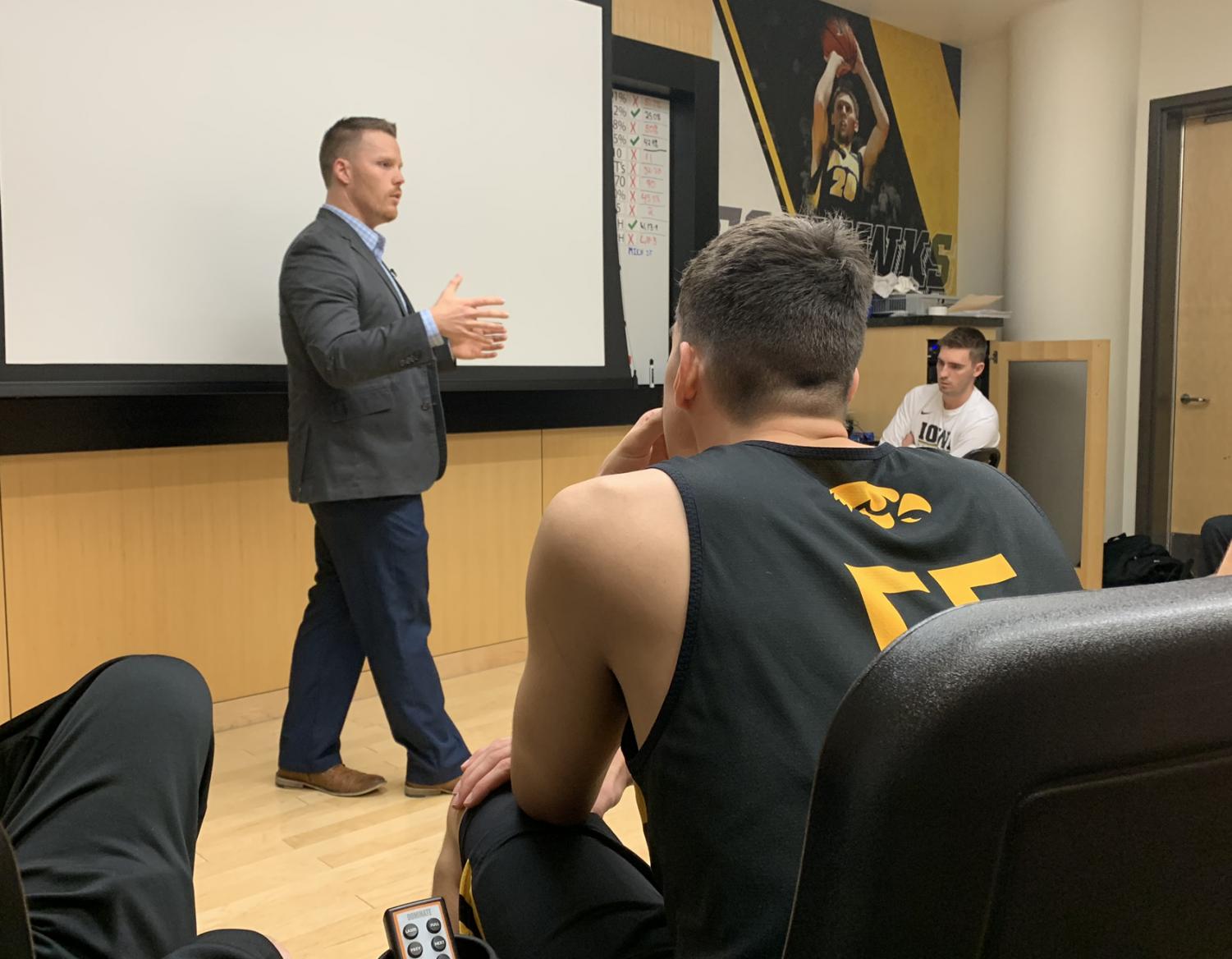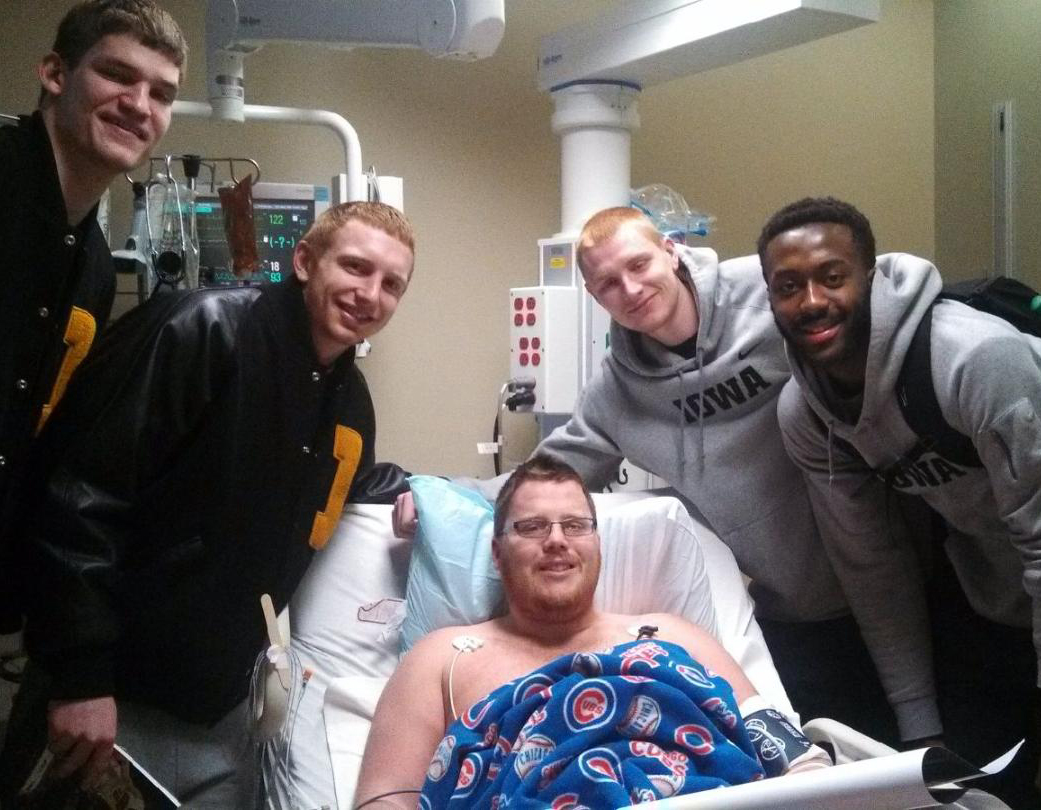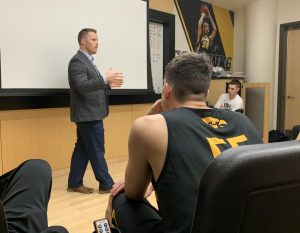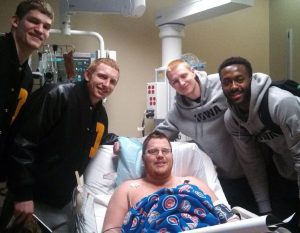UNI alum tells story of battle against cancer
Apr 8, 2019
Most college students are focused on getting through exams, finding internships and job hunting. At 23 years old, then-UNI student and now alum Dylan Slattery was simply focused on surviving. He was fighting cancer for the second time. Not just any cancer, either: Stage four melanoma.
Slattery was told the chances of him living were less than 15 percent. Five years after that would-be fateful diagnosis, Slattery has lived to tell the tale.
The year 2013 came with obstacle after obstacle for Slattery. In February, he endured a breakup. In April, he received his first melanoma diagnosis. Then in December, he was part of a car crash that took the life of one of his friends.
“I was majoring in economics and social studies education at Northern Iowa and I was doing well,” Slattery said. “Then all of the sudden, through these events that I started to let define me, I totally lost my sense of purpose, my sense of direction and sense of hope. I was self-medicating with alcohol and drugs and suffering from depression to a point where I was sleeping for up 16 hours after the accident. I literally didn’t want to wake up.”
Cancer also left its visible mark on Slattery the first time around in the form a seven-inch scar stretching from his ear to his jawline. Despite it all, doctors told Slattery he was expected to make a full recovery.
“They thought that all the lymph nodes that they tested came back clean,” said Slattery. “They thought that they got it all and life went back to ‘normal,’ although I would frequently get asked about the scar because it looked pretty gnarly. And I wanted nothing to do with being a 22-year-old with cancer. I would deflect a lot. I would make up stories or just change the subject.”
The doctors ended up being wrong. In fall 2014, Slattery woke up with a golf ball-sized lump below his jawline.
“I couldn’t even speak right because the right side of my mouth wouldn’t open all the way,” Slattery recalled. “I had a feeling it was back, but to this day, I just pretended nothing was going on. I put that mask on pretending I was fine.”
At this point, Slattery had left UNI at the urging of his family and friends. They could all see he was severely depressed, and his mom was even more worried since the family had dealt with suicide before. Her husband, Dylan’s father, had taken his own life just one month before Dylan was born.
Slattery’s only treatment option for this second cancer diagnosis was an experimental one in Iowa City.
“It wasn’t FDA-approved,” Slattery said. “Really their goal was to contain what was already there. They weren’t trying to wipe it out. They were trying to give the researchers time to find something that would work.”
During treatment, Slattery became very protective about who he let into his life. Even though his chances of surviving were slim, he only wanted to be around people who believed in him. He credits this as “one of the keys to overcoming the disease.”
“It was a very strange time because I had this false sense of confidence,” said Slattery. “Cancer literally gave me something to fight for when life wasn’t worth fighting for. And the mindset that I brought in each and every week was, ‘I’m going down swinging. I’m going to give it my all.’”
Even during his cancer treatments, Slattery continued to self-medicate with drugs, alcohol and food, but things started to change for him when a woman across the hall from him in the ICU passed away. He realized that if the same thing happened to him—if the statistics proved true and he passed away from cancer—he didn’t want to leave behind the legacy of what his life had been like for the last three years.
Just a day or two after that, Slattery’s younger brothers paid him a visit.
“I’d always taken so much pride in being the oldest and the big brother that they looked up to, to be a good example,” Slattery said. “I just felt like I was letting them down. So that’s when things started to change in terms of setting the standard for what my life would look like after this was over.”
In January 2017, against all odds, Slattery was declared cancer-free.
Today, Slattery uses his experiences to help others through his podcast “Stage Four 2 On Stage” and speaking engagements. He is also currently writing a book with his mother to share his story. “Adversity is a universal experience,” Slattery said. “We all have it in some shape or form, and it wears a lot of different masks.”
On his podcast, Slattery has interviewed another two-time cancer survivor, Sean Swarner. Swarner was the first cancer survivor to climb Mount Everest.
Every year, Swarner awards a Cancer Climber Grant to a fellow cancer survivor. This year, Slattery was given this award, and he will be climbing Kilimanjaro with Swarner this summer.
Since Slattery now resides in Colorado, he’s become no stranger to summitting. Between May and October of 2018, he’s climbed 9 “14-ers,” which are mountains over 14,000 feet high. Kilimanjaro is over 19,000 feet high.
“There’s so many people who need a place to turn to,” Slattery said. “So many people who need to be told they’re not alone. And ultimately the message is this: whatever events in your life happen to you, those events do not define [you]. Ultimately, we get to define those events.”

















